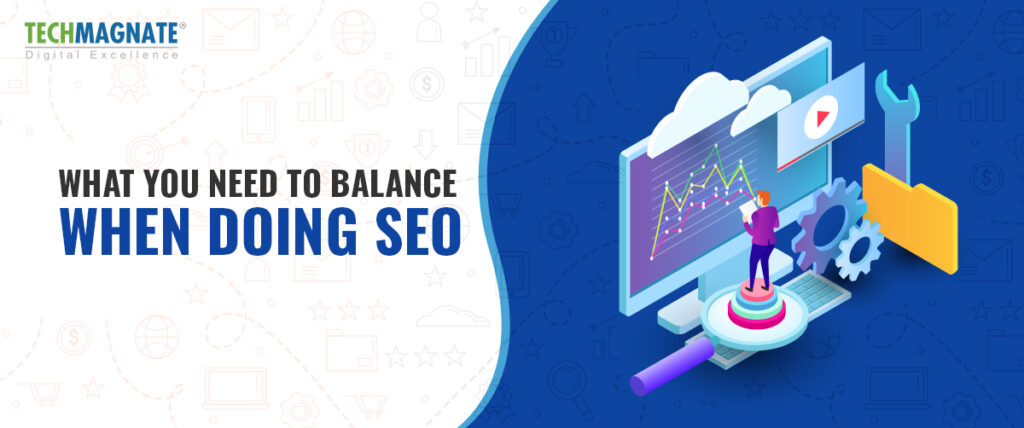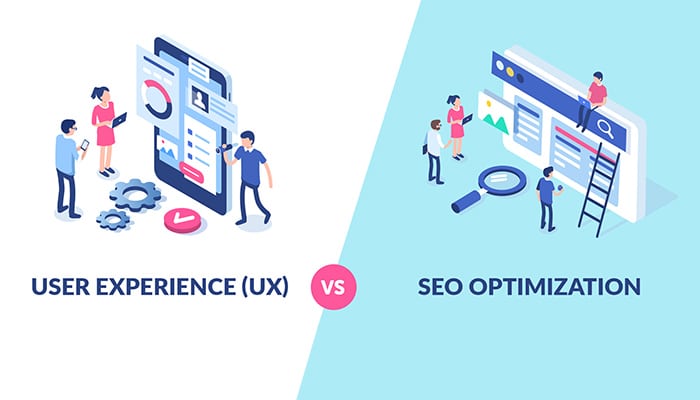When doing SEO, it is crucial to balance various elements such as keywords, backlinks, user experience, and content depth. Going overboard or neglecting any aspect can have negative consequences on your website’s visibility and success. It’s important to find the equilibrium between on-page and off-page SEO, focus on quality keywords rather than quantity, prioritize user experience while meeting search engine requirements, and find a balance between content depth and readability. Additionally, balancing short-term strategies for quick wins with long-term strategies for sustained growth is key. By striking the right balance, you can achieve SEO success and stay relevant in the ever-changing digital landscape. When doing SEO, there are several elements that need to be balanced in order to achieve success. These elements include on-page vs. off-page SEO, keyword quantity vs. quality, user experience vs. search engine requirements, content depth vs. readability, and short-term vs. long-term strategies. By finding the right equilibrium between these factors, you can optimize your website and improve its visibility in search engine results. In this article, we will explore each of these elements in detail and provide insights on how to strike the right balance.

On-page vs. Off-page SEO
On-page and off-page SEO are two essential components of a comprehensive SEO strategy. On-page SEO refers to optimizing the individual pages of your website to rank higher in search engine results and attract relevant traffic. This involves elements such as meta descriptions, title tags, and internal linking. On the other hand, off-page SEO focuses on building the trust and authority of your website through external factors, primarily backlinks from other websites. It is like a seesaw where both sides need attention for optimal results.
To strike the right balance between on-page and off-page SEO, it is crucial to give equal importance to both. While on-page SEO ensures that your website is optimized for search engines, off-page SEO helps in establishing your website’s reputation and credibility. Neglecting either of these elements can lead to suboptimal results and hinder your website’s visibility.
Keyword Quantity vs. Quality
Keywords are the backbone of SEO as they help search engines understand the relevance of your content to users’ queries. However, when it comes to keywords, striking the right balance between quantity and quality is crucial. Targeting too many keywords can lead to dilution of your efforts, while focusing on niche keywords may result in missed opportunities for attracting organic traffic.
When it comes to keyword quantity, it is important to avoid the scattergun approach of targeting every possible keyword related to your business. Instead, focus on high-quality keywords that have decent search volumes and align with the intent of your target audience. Quality keywords are worth their weight in gold and can significantly improve your website’s visibility in search engine results.

User Experience vs. Search Engine Requirements
While search engines’ algorithms play a significant role in determining your website’s ranking, it is important to remember that you are ultimately trying to appeal to human users. Prioritizing user experience is crucial as it ensures that your visitors find value in your website, leading to longer visit durations and increased engagement. When users are happy, search engines are also more likely to recognize the quality and relevance of your content.
User experience encompasses various aspects such as readability, navigation, and overall website experience. It is important to create content that is easy to read, navigate, and understand. A clean and intuitive website design, clear headings, and organized content structure can greatly enhance the user experience.
While it is important to meet the requirements set by search engines, it should not be done at the expense of user experience. Google’s main aim is to provide users with relevant and high-quality content, so striking the right balance between user experience and search engine requirements is crucial.
Content Depth vs. Readability
Creating content that strikes the right balance between depth and readability is essential for SEO success. Deep, comprehensive content can position you as an authority in your industry and attract high-quality backlinks. However, it is important to ensure that your content is still accessible, engaging, and easy to digest for your readers.
When creating content, delve deep into the topics and provide valuable insights and information. However, avoid going down the rabbit hole so deep that your readers find it difficult to follow. Use a conversational tone, break up your content into shorter paragraphs, and incorporate relevant visuals to enhance readability.
By finding the balance between content depth and readability, you can create content that showcases your expertise while ensuring that it is easily consumable by your target audience.

Short-term vs. Long-term Strategies
SEO is not a sprint but rather a marathon. While short-term strategies can provide quick wins and immediate traffic boosts, it is the long-term strategies that ultimately lead to sustained success. It is important to strike a balance between these two approaches to achieve optimal results.
Short-term strategies may include tactics such as pay-per-click (PPC) ads, short-term link-building strategies, and optimizing for trending topics. While these strategies can provide immediate results, they should not be the sole focus of your SEO efforts. Long-term strategies, on the other hand, involve building a robust backlink profile, consistent content creation, and focusing on evergreen topics that will continue to attract organic traffic over time.
By combining short-term and long-term strategies, you can achieve a balance between immediate results and long-lasting success in your SEO endeavors.
Frequently Asked Questions
What is the biggest mistake people make in SEO?
The biggest mistake people make in SEO is prioritizing chasing algorithms instead of focusing on quality content and user experience. Search engines are constantly evolving, and their algorithms are designed to prioritize high-quality, relevant content that provides value to users. By prioritizing the user and creating content that meets their needs, you are aligning yourself with the goals of search engines and setting yourself up for success.
How often should I update my SEO strategy?
SEO is an ever-evolving field, and it is important to stay updated with industry changes and best practices. While you may not need to revamp your entire SEO strategy every week, it is a good idea to regularly assess your strategy, monitor your website’s performance, and make necessary adjustments to keep up with the dynamic nature of the search landscape.
Do backlinks still matter?
Yes, backlinks still matter in SEO. While their importance may have shifted over time, backlinks continue to be a critical factor in determining a website’s authority and trustworthiness in the eyes of search engines. High-quality backlinks from reputable websites can significantly boost your website’s visibility and organic ranking.
Is mobile optimization still crucial?
Yes, mobile optimization is still crucial in today’s digital landscape. With the increasing number of users accessing websites through mobile devices, having a mobile-friendly website is not just a good practice, but a necessity. Search engines also prioritize mobile-friendly websites in their rankings, so ensuring that your website is optimized for mobile devices can significantly enhance your visibility and user experience.
What’s more important: quality or quantity of content?
When it comes to content, quality always trumps quantity. It is better to have ten outstanding pieces of content that provide real value to your audience rather than a hundred mediocre ones. High-quality content not only helps in attracting organic traffic and backlinks but also establishes your credibility and authority in your industry. Focus on creating valuable, informative, and engaging content that meets the needs of your target audience.

Conclusion
Achieving success in SEO requires a delicate balance of the different elements involved. By finding the right equilibrium between on-page and off-page SEO, keyword quantity and quality, user experience and search engine requirements, content depth and readability, and short-term and long-term strategies, you can optimize your website and improve its visibility in search engine results. Balancing these elements can be challenging, but with a clear understanding of what to prioritize and how to strike that elusive balance, you’ll be well on your way to SEO success. Remember, the digital world waits for no one, so stay updated, stay relevant, and most importantly, stay balanced.